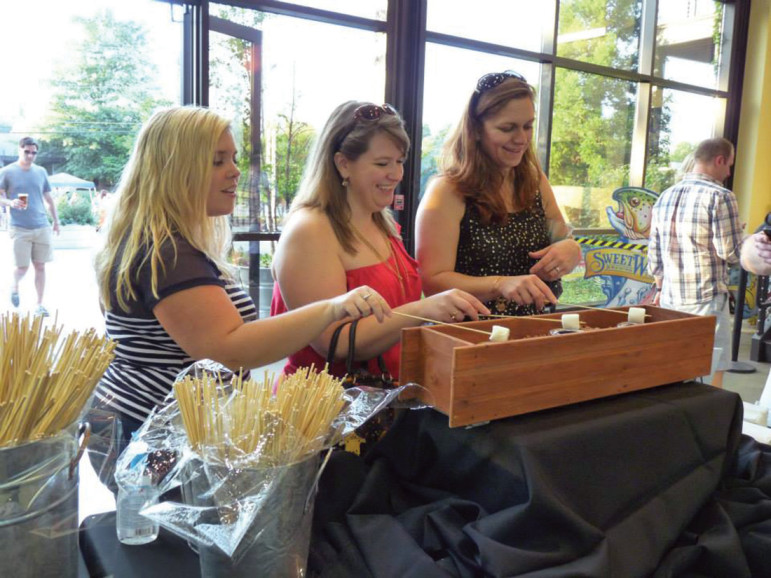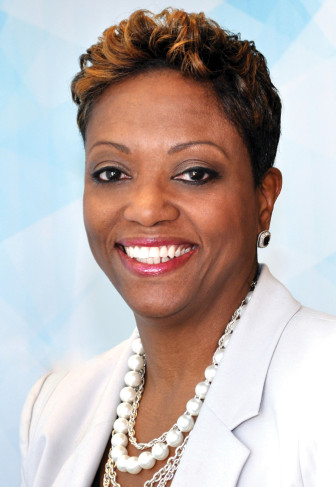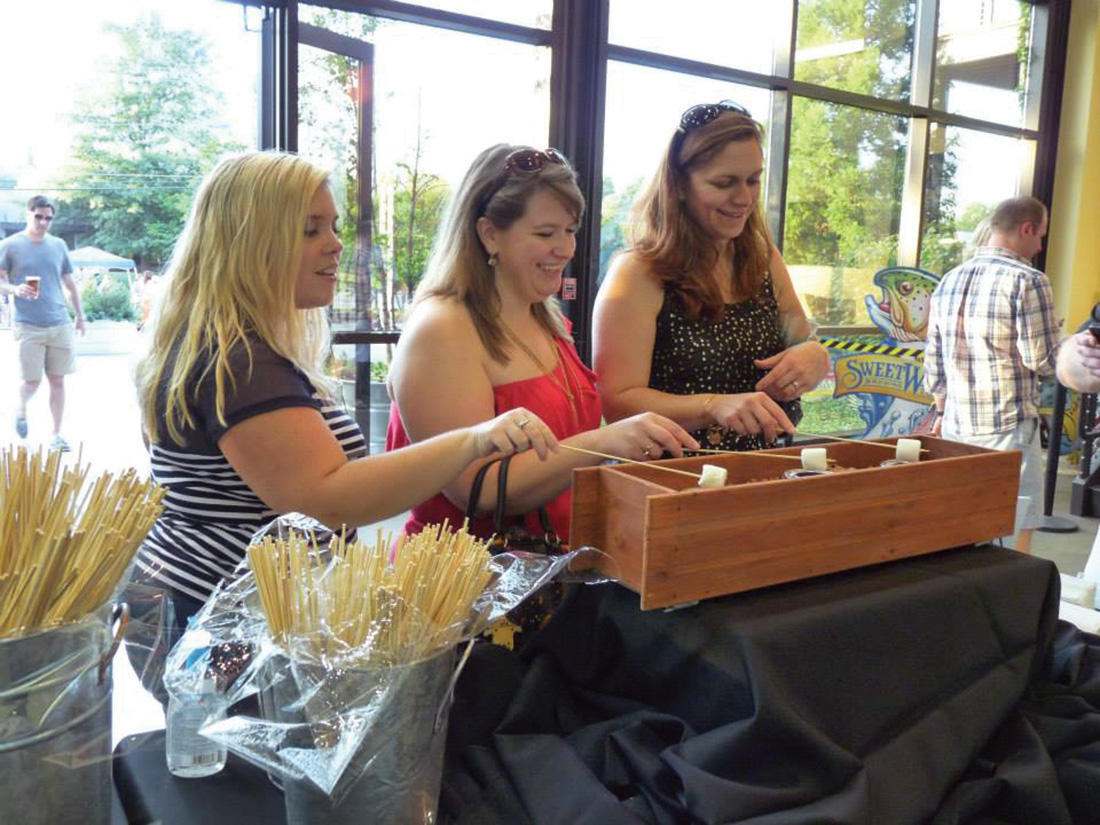
Camp Twin Lakes
Volunteers from Camp Twin Lakes’ junior board, Young Atlanta Leadership League, enjoy a s’mores bar at an event called Camp Fest.
Imagine conducting a job interview, and you tell the candidate the job doesn’t pay.
Then you remind the candidate that he or she is going to be responsible for overseeing the work of chief staff.
And has responsibility for the company’s finances and legal compliance.
Who’s going to take this job? A nonprofit board member.
How do you build the best board of these unpaid workers? That’s a tougher question to answer but is essential to any organization’s success. Boards are required by law for nonprofits, and while it’s up to each group to determine the number of members, the choice of board size and members’ qualifications and composition has a lasting effect on any organization.
Nonprofit management experts offer several great strategies, however, that can work for youth-serving organizations, no matter the size.
Most agreed it’s important to look at the organization’s goals and plans for the future before looking at potential board members.
“The board is your most important part of your organization,” said Eric Robbins, CEO of Camp Twin Lakes, a 20-year-old Atlanta nonprofit serving more than 9,000 young people with serious illnesses, disabilities and other life challenges. “The success of everything you do will depend on the success of the board.”
Begin with the end in mind
“The first step is definitely to think about where the nonprofit is going,” said Jennifer Chandler, vice president and director of network support and knowledge sharing at the National Association of Nonprofits in Washington, D.C. Knowing your future needs will influence the skills and resources you want to bring to the board table.
Are you about to expand? Are you opening a new center? Are you about to kick off a big campaign?
“I think it’s always helpful to do a board-planning matrix, where you look at your goals for the immediate future and later,” said Amy Duggan, director of the Center for Nonprofit Excellence in Albuquerque.
“If you’re getting ready to do a capital campaign, for example, you will want to look at your current board and see if there are gaps there,” said Duggan, referring to fundraising or management of a construction project.
Ditto for if you are getting ready to build onto a center for after-school activities, said Chandler. You might then want someone on your board who understands zoning issues.
Diverse mix reduces blind spots
Having a mix of backgrounds is essential, agreed Vernetta Walker, chief governance officer and vice president of programs at BoardSource, a group that specializes solely in governance issues of nonprofits, also in Washington, D.C. The mix — including people of different genders, race and age — adds to diversity of thought and leadership.
“You want your organization to be diverse and inclusive, and to make sure you don’t have any blind spots,” Walker said. “It’s not easy, but it’s worth putting the time into it.”
Preventing those blind spots through diverse backgrounds is actually “part of enacting a risk-management strategy,” Chandler noted.
“An important fiduciary responsibility of the board is to plan for the future,” Chandler said. A diverse board is the best way to ensure that’s happening.

“You want your organization to be diverse and inclusive, and to make sure you don’t have any blind spots. It’s not easy, but it’s worth putting the time into it” says Venetta Walker, chief governance officer and vice president of programs at BoardSource.
Don’t overlook another important fiduciary duty — making sure all board members contribute financially and that many have the ability to give generously, said Patricia White and Roderick Jenkins of the New York Community Trust, New York City’s community foundation, providing grants to all kinds of charitable groups in New York. One of White’s and Jenkins’s responsibilities is assessing board strength when awarding grants to nonprofits.
“You have to be willing to part with your money,” Jenkins, program officer in the Children, Youth and Families program of NYCT, said of potential board members.
Many nonprofits that work with young people tend to attract a lot of community workers and activists, and those people can be great additions to the board, Jenkins said. But don’t pack your board with them. It helps to have people on the board who have the ability and the willingness to donate money as well as time.
That willingness to give financially is only a part of the equation, though, because you want board members who will donate their time and who are completely committed to your cause, said White, program director at NYCT.
A diverse board is also essential to show the community you serve that you are in tune with the community.
Engage local heroes
Megan Hodges, director of development for Harlem RBI, an award-winning nonprofit that operates in Harlem and The Bronx, said it is important to consider your local resources. Being in New York, It helps to have board members with finance backgrounds or who are connected to local financial institutions.
“And it always helps if you can find a New York Yankee,” she said light-heartedly of having Yankees first baseman Mark Teixeira on Harlem RBI’s board. Teixeira’s interest brings the interest of other athletes.
“They (the kids) love having him around,” Hodges said. “But he doesn’t come and talk about being a New York Yankee,” she said of the Georgia Tech alum who passed up the baseball draft to go to college. “He talks about staying in school and hard work.”
The best part about Teixeira’s involvement is the same as other board members, Hodges said.
While not all nonprofits have access to board members with as much celebrity as a New York Yankee, any nonprofit can appeal to local heroes who might bring a dedicated base with them.
Ongoing recruitment for time and talent
It’s important to make sure your board members will be strong advocates for your cause, for youth and for your organization, said Robbins of Camp Twin Lakes.
“They need to be influential people who can leverage other people,” Robbins said. Much of that is dependent on skills that your board members already bring to the table, as training time for board members is often a luxury.
[module type=”aside” align=”right”]Tips for filling your board
- Consider your mission and your future
- Consider any upcoming expansions, capital campaigns
- Include a diversity of professions and backgrounds
- Include a diversity of gender, race and ethnicity
- Court potential board members over time
- Be clear about expectations. Prepare a document that clearly outlines duties and term limits.
SOURCES: National Association of Nonprofits, BoardSource, National Center for Nonprofit Excellence.
[/module]Chandler also suggested recruiting people who know your nonprofit from having done business with it.
“Sometimes we overlook the local business community,” she said. “But think about the manager of the print shop, or office supply stores, people you’ve talked with about your mission. While you wouldn’t want to bring on a current vendor, maybe a former vendor could contribute.”
Any board member also needs to understand the personal financial commitment he or she will be expected to contribute or to raise — and also to understand how they are to serve as an ambassador or advocate, Walker said. Also, board members must be trained to know that it is illegal to profit from their nonprofit work.
A nonprofit should always be in the process of recruiting potential board members by inviting prospects to visit the organization, to sit in on a board meeting if bylaws allow, or to otherwise get involved them before a board seat is open.
One way to do that is to have a “junior” board, made up of people in their 20s and 30s who want to be involved and develop their leadership skills. Camp Twin Lakes in Atlanta has a junior board called Y’ALL — Young Atlanta Leadership League — with 40 participants and an eight-member executive board, offering time and talent that the governing board may not have, while building a pipeline for ongoing leadership.

























